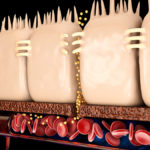By James Lemire, M.D., Advanced Natural Wellness
January 01, 2014
- What’s your New Year’s Resolution?
- The first step to living a healthier, happier and longer life
- 5 toxic foods you probably eat every day
This year we would like to introduce an additional contributor to the Advanced Natural Wellness newsletter: James Lemire, M.D.
Dr. Lemire has built a reputation for success with problems other doctors often can’t or won’t treat. This includes problems like fibromyalgia, chronic fatigue and other imbalances. He has helped thousands of “untreatable” patients achieve new levels of health and freedom.
Dr. Lemire’s philosophy is simple. He treats the whole person. All of his tests and treatments are uniquely designed around each patient’s individuality. And he includes natural therapies wherever they can help.
To kick off the New Year, Dr. Lemire is sharing his “5 R’s for optimal health.” The 5 R’s are the foundation of the program he uses at his clinic. And they offer a unique approach to helping you live a happier, healthier and longer life.
Let’s get started…
When we talk about New Year’s resolutions, the general advice is to keep them simple and make sure they are achievable.
All right, I’ll buy that. But what if you could reach for the sky and still be able to attain your goal? And what if achieving the goal would have a profoundly positive affect on the remainder of your life?
How about trying this on for a New Year’s resolution…
I will live a healthier, happier and longer lifetime!
Go ahead. Say it out loud. Savor the sound of it. Embrace it. Because right now I’m going to show you exactly how you can pull it off.
Open your arteries, improve blood flow for a new health miracle...
Did you know your circulatory system has over 60,000 miles of arteries, veins and other blood vessels, if stretched end to end?
But as you age, your blood vessels undergo changes, which may cause them to stiffen, thicken and get clogged.
GOOD NEWS! Doctors have now identified a “Miracle Molecule” inside your arteries that helps OPEN your arteries and IMPROVE blood flow.
It’s what Dr. Valentin Fuster calls it, "One of the most important discoveries in the history of cardiovascular medicine."To you, that means...
- Healthy blood pressure
- Sharper mind and memory
- Skyrocketing energy and muscular strength
- Increased pleasure and passion in the bedroom
- Improved circulation to every cell and organ in your body
Go here to discover a new natural way to significantly boost the levels of this miracle molecule in YOUR body NOW!
Don’t believe me? Well over the next few weeks, you will find out how a few simple changes can literally change your life.
It’s a straightforward 5-step program that I use here at the Lemire Clinic. My patients love it because it’s so “do-able.”
- Recognize the underlying cause of today’s most common health concerns.
- Remove anything that is contributing to your poor health.
- Replace toxic elements with foods and nutrients that nourish your body.
- Regenerate your body from head to toe.
- Revitalize every part of your life with positive transformation.
When you follow the advice in each of the 5 steps you’ll have more energy, lose weight, sleep better, think more clearly and experience less pain and stiffness. You will even look younger and notice a surprising difference in the health of your skin, hair and fingernails.
Are you ready to get started?
When is the last time you felt well? By “well,” I mean really healthy, energetic and vibrant. Do you remember?
Well, that’s exactly where you want to get back to. But the first step to getting there is to recognize the real cause of most of today’s health problems.
It’s not your cholesterol or your triglycerides. It’s not your weight. It’s not even inflammation.
No. It’s none of those.
Instead, it’s something that causes your body to misbehave which, in turn, causes all of these problems… heart disease, weight gain, inflammation and more.
It’s the sea of toxins we are living in. They’re in the air we breathe, the foods we eat and the personal care products we put on our bodies.
And do you know what your body does when it’s constantly bombarded by these toxins?
It captures the toxins in your body in pockets of fat until the body can safely remove them. But when we are constantly exposed to large quantities of toxins, the body can never catch up to the process.
So more and more fat cells are needed to protect your vital organs from toxic overload.
I call this toxibesity™. And it may be one of the chief reasons so many people are overweight and experiencing heart problems, fatigue, diabetes and other age-related health concerns.
And while these toxins come from all over the place, today I want to talk about some of the ones you are getting in your food supply – and need to remove from your diet.
The World's Quickest Solution for Ending Prostate and Urinary Misery
This has recently been revealed to be one of the only real breakthroughs in prostate health.
The seeds of a strange fruit (sometimes called "Chinese Apples") hold powerful phytonutrients that are a revolution in prostate health.
In fact, UCLA and Veterans Administration research have now proved this to be true.
Not only that, but it may be the worlds quickest solution for ending prostate misery.
Simply stated, these phytonutrients represent a huge step beyond beta sitosterol, saw palmetto, and other phytosterols alone.
Simply click HERE if you want to have fast prostate relief...restful, uninterrupted sleep...no more constant "urges to go"...enhanced virility...and optimal prostate support for life.
People often don’t realize certain foods can be toxic. They may even think some of those foods are good for them. So now I’m going to clear some things up for you.
Here are the top 5 toxic foods that might be a part of your diet. Over the next few weeks start removing these foods from your diet until you can eliminate them completely…
Toxic Food #1: Sugar/high fructose corn syrup (HFCS). You might find it interesting to learn you can find sugars in about 75% of the foods we eat. But it’s not coming from the package of sugar you have in your kitchen cabinet. The majority of it comes from packaged foods like breads, yogurt, sauces and even peanut butter.
Both sugar and HFCS are a real health menace. A key factor is the way these sweeteners increase insulin response and promote inflammation. This causes weight gain and contributes to serious health threats like cancer, diabetes and heart disease. These sweeteners also have a negative impact on your cholesterol and triglycerides. Of course, this adds to your risk of heart attack and stroke.
Toxic Food #2: Artificial Sweeteners. If you are trying to cut back on sugar, you might be tempted to reach for an artificial sweetener. But that’s not a good idea, either.
Aspartame, which you may know as NutraSweet, has an effect on the brain that’s almost as bad as cocaine. And it does horrible things to both your brain and body. The aspartic acid acts in a way that excites the central nervous system.
This excitement can cause headaches, insomnia, seizures and other neurological side effects. It’s also believed to affect certain neurotransmitters in the brain that could affect emotional functioning.
It’s also important to know artificial sweeteners cause weight gain.
People who use sweeteners like aspartame and saccharin tend to eat larger meals and take in more calories than people who don’t. Worse, they are more likely to have diabetes and insulin resistance.
Toxin Food #3: Wheat. Wheat has been a staple of our diet since biblical times. But since that time the genetic composition of wheat has changed drastically. Throughout years of hybridization the gluten and starch content in wheat has increased tremendously.
Gluten is the protein linked to celiac disease and inflammation, and that’s big problem for many people today.
Another problem is that the starches in wheat act as a super carbohydrate. Just two slices of whole wheat bread is just as bad as – and often worse than – drinking a can of soda or eating a candy bar.
It quickly breaks down to sugar in your blood and increases insulin response.
And we know what that means… inflammation, weight gain, diabetes, high triglycerides and cholesterol… perhaps even cancer.
Toxic Food #4: MSG. MSG is one of those sly chemicals that are often lurking in your food. As a matter of fact, there are about 40 different names for MSG – so it’s easy to slip your notice.
But no matter what name it’s disguised under, if you’re allergic to it, it can cause serious reactions – even seizures and an irregular heartbeat.
For those who aren’t allergic, the consequences can be just as serious. They include increased risk for brain damage, cancer, heart disease, memory loss and obesity – just to name a few.
Toxic Food #5: Genetically Modified Foods. Genetically modified foods (GMOs) have become a serious problem in modern society. Almost all corn and soy beans are modified these days.
And like MSG, GMOs are sneaky – maybe even sneakier – because they don’t have to be listed on food labels.
You should know, however, that GMO foods are heavily doused with chemicals that cause cancer, affect your hormones and might even damage your body at the cellular level. With this in mind, it is important to avoid foods that have any form of soy or corn on the ingredient list.
So now you know which 5 foods are the most toxic to your body.
But what about other toxins in your environment… and the ones that are already in your body? And what are you supposed to eat?
Don’t you worry. Once per week over the next few weeks I’ll share everything you need to get your New Year started right and send you right down the road to a happier, healthier and longer life.
Resources:
Is sugar toxic? 60 Minutes. Apr 2012.
Welsh JA, et al. Caloric sweetener consumption and dyslipidemia among US adults. JAMA. 2010 Apr 21;303(15):1490-7.
Rogers PJ, Blundell JE. Separating the actions of sweetness and calories: effects of saccharin and carbohydrates on hunger and food intake in human subjects. Physiol Behav 1989; 45:1093–1099.
Lavin JH, et al. The effect of sucrose- and aspartame-sweetened drinks on energy intake, hunger and food choice of female, moderately restrained eaters. Int J Obes Relat Metab Disord 1997; 21:37–42.
ENDO 2009: The Annual Meeting of the Endocrine Society: Abstract P2-478. Presented June 11, 2009. Source: www.medscape.com
Koller VJ, et al. Cytotoxic and DNA-damaging properties of glyphosate and Roundup in human-derived buccal epithelial cells. Arch Toxicol. 2012 May;86(5):805-13.
Gasnier C., et al. (2009) Glyphosate-based herbicides are toxic and endocrine disruptors in human cell lines. Toxicology. 262: 184–191.
Russell L. Blaylock, M.D. Excitotoxins – The Taste That Kills (Santa Fe: Russell L. Blaylock, M.D., 1997)






